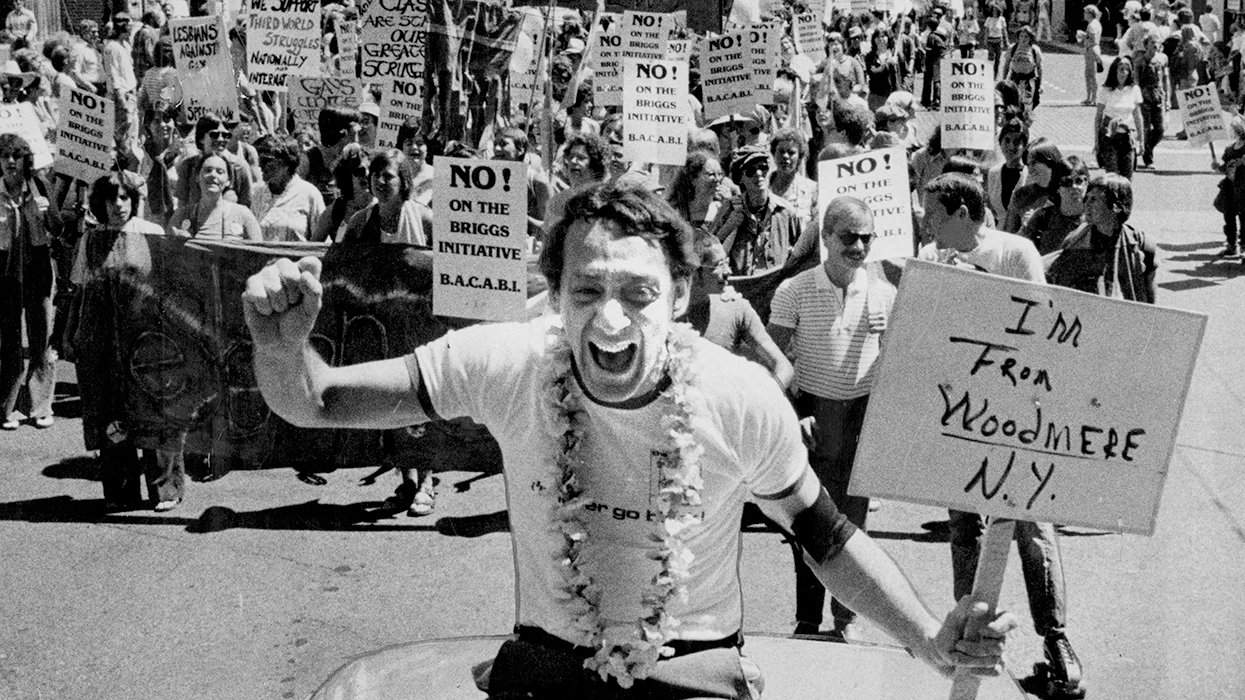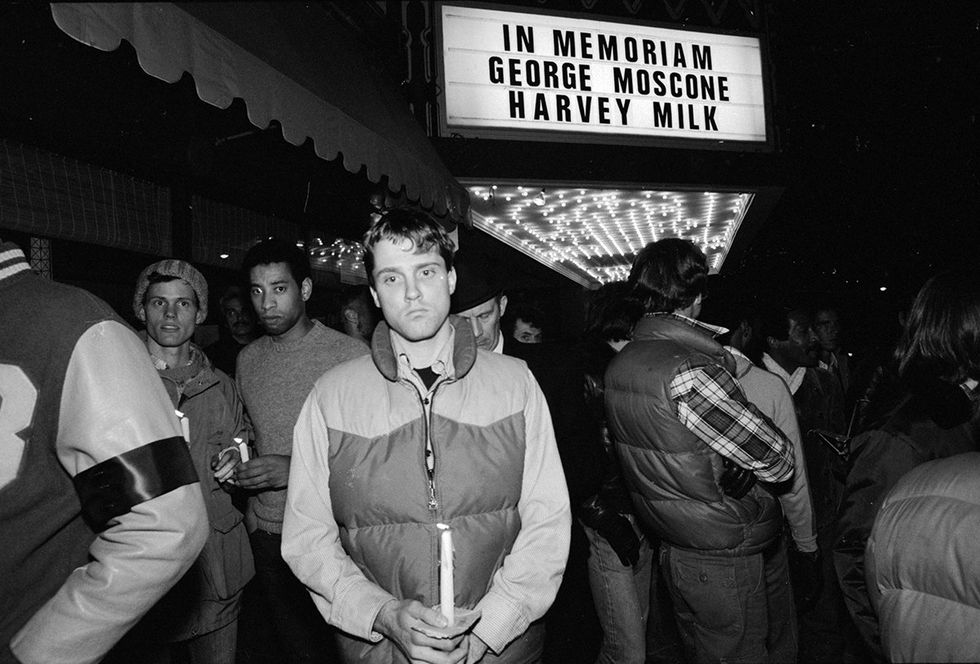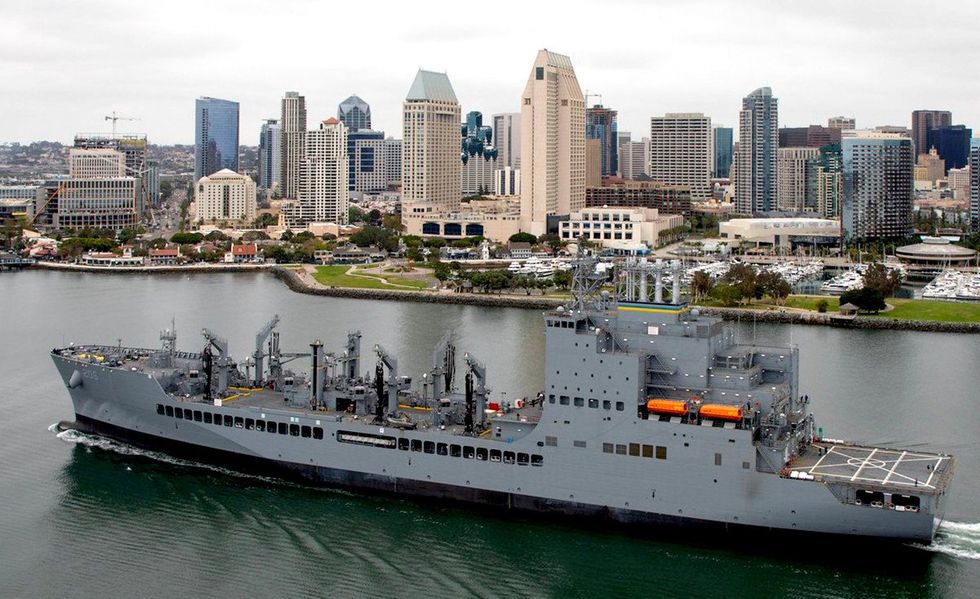Harvey Milk was a groundbreaking political figure and an activist in the LGBTQ+ rights movement.
Harvey Milk was born in 1930
Milk was born in Woodmere, on New York's Long Island, on May 22, 1930, to William and Minerva Milk. He had a brother, Robert. Both of his parents had served in the Navy. They ran a family store called Milk's Dry Goods and were active in the Jewish community on Long Island. Among other things, they helped found a synagogue.
Milk went to college at what is now the State University of New York in Albany, studying math and history, and writing a column for the student newspaper, often dealing with issues of diversity, according to the Harvey Milk Foundation. After he graduated college in 1951 he joined the Navy. He went to officer candidate school, but he left the Navy in 1955 after questions about his sexual orientation began popping up. Milk went on to work as a teacher on Long Island, then became a stock analyst and later a production associate on Broadway. He worked on several high-profile shows, including Hair and Jesus Christ Superstar.
Milk began his activist career while protesting the Vietnam War. In the early 1970s, he moved to San Francisco and opened a camera shop on Castro Street. The camera store became a community gathering place, and Milk's political activity increased. After some gay business owners met with hostility from established merchants, he helped found the Castro Village Association and became its president. It was the first predominantly LGBTQ+ business organization in the U.S.
 Bettmann Contributor via Getty Images
Bettmann Contributor via Getty Images
Harvey Milk made history in 1977
In 1977, Milk was elected to the San Francisco Board of Supervisors, making history as the first out gay elected official in California. It was his third race for the board, which is San Francisco's version of a city council. He had made a run for the California State Assembly as well.
His election was a significant milestone for the LGBTQ+ movement, symbolizing the community’s growing political power and visibility. He also noted what it meant for other marginalized groups. "It's not my victory, it's yours and yours and yours," he said after winning the election. "If a gay can win, it means there is hope that the system can work for all minorities if we fight. We've given them hope."
Milk used his position to champion various progressive causes, including affordable housing, public transportation, and civil rights. He played a crucial role in defeating Proposition 6, a.k.a. the Briggs Initiative, a 1978 ballot measure that sought to ban LGBTQ+ people from working in California’s public schools.
Milk often stressed the importance of being out. “We are coming out to fight the lies, the myths, the distortions," he said in one of his speeches. "We are coming out to tell the truths about gays, for I am tired of the conspiracy of silence, so I’m going to talk about it. And I want you to talk about it. You must come out.”
“Harvey understood that the single most important political act anyone could take was simply to come out — to reveal their true nature to their friends, families and coworkers,” his fellow activist Cleve Jones told NBC News in 2018. “Harvey understood that that was important, because he understood that hatred of us was grounded in fear, and that that fear would evaporate once people could understand that in fact they had gay people in their families and in their congregations and in their neighborhoods.”
Harvey Milk's death
Milk’s life was cut short on November 27, 1978, when Dan White, a disgruntled former city supervisor, assassinated him and Mayor George Moscone. White had resigned from the Board of Supervisors but wanted to rejoin it, and he believed Moscone and Milk were blocking him from that. The murders shocked the nation and sparked widespread outrage and activism. Police charged White with two counts of murder and illegal firearms possession. Dianne Feinstein, then president of the Board of Supervisors, became acting mayor following the tragedy.
The assassinations shocked San Francisco and the nation. Stunned friends and colleagues expressed their grief and admiration. President Jimmy Carter acknowledged Milk as “a leader of San Francisco’s gay community, who kept his promise to represent all constituents.”
 Roger Ressmeyer/CORBIS/VCG via Getty Images
Roger Ressmeyer/CORBIS/VCG via Getty Images
Thousands of San Franciscans paid their respects as Milk and Moscone lay in state at City Hall. A massive candlelight march from the Castro district to City Hall honored Milk’s legacy, with more than 25,000 people participating.
Milk had received numerous death threats due to his activism. He left a recording to be played after his death in which he said, “If a bullet should enter my brain, let that bullet destroy every closet door in the country.”
White was convicted in 1979 of manslaughter, not murder, and received a sentence of eight years in prison, which was widely considered too light. Outraged San Francisco residents lashed out in what became known as the White Night Riots in May 1979. White was released from prison in January 1984, having served only a portion of his sentence, and he died by suicide in 1985.
Harvey Milk's legacy
In 2018, on the 40th anniversary of Milk’s assassination, The Advocate spoke with his nephew, Stuart Milk, who cofounded the Harvey Milk Foundation. Stuart Milk highlighted his uncle’s courage and the ongoing relevance of his legacy. He recalled that Harvey Milk was a touchstone for his self-acceptance and authenticity, noting that his uncle’s courage was evident as he campaigned for office when it was illegal to be openly LGBTQ+ in California.
 NASSCO
NASSCO
In March the USNS Harvey Milk, the first U.S. Naval ship named after an out gay person, embarked on its maiden voyage. A ceremony was held in San Francisco to honor Milk, attended by local and national officials, including San Francisco Mayor London Breed and Rear Admiral Richard Meyer. Stuart Milk and Anne Kronenberg, Milk’s campaign manager, also spoke at the event. House Speaker Emerita Nancy Pelosi noted that the late Sen. Dianne Feinstein was one of the original sponsors of the ship.
Milk’s enduring impact on LGBTQ+ rights and his pioneering role in American politics make him a seminal figure in civil rights history. His life and work have been commemorated in numerous ways, including the annual Harvey Milk Day in California, celebrated on his birthday, and the Harvey Milk Foundation, which continues his advocacy for LGBTQ+ rights globally. His story has been told in the 1982 book The Mayor of Castro Street by Randy Shilts; Rob Epstein's 1984 documentary film The Times of Harvey Milk, which won the Oscar for Best Documentary; and the 2008 biographical film Milk, starring Sean Penn, written by Dustin Lance Black and directed by Gus Van Sant. Penn won the Oscar as Best Actor, and Black won for his screenplay. An opera and several plays have also chronicled Milk's life.
There are schools and other public buildings named after Milk. In 2009, President Barack Obama posthumously awarded him the Presidential Medal of Freedom, the nation's highest civilian honor. Stuart Milk accepted the medal.
 Terry Schmitt/San Francisco Chronicle via Getty Images
Terry Schmitt/San Francisco Chronicle via Getty Images


 Roger Ressmeyer/CORBIS/VCG via Getty Images
Roger Ressmeyer/CORBIS/VCG via Getty Images NASSCO
NASSCO


































































Charlie Kirk DID say stoning gay people was the 'perfect law' — and these other heinous quotes